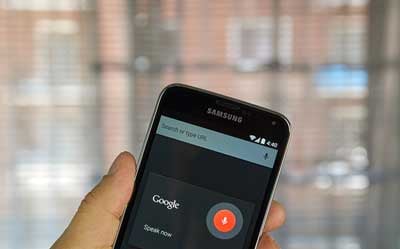 Fifty years ago when Star Trek first debuted, the Enterprise did some pretty radical stuff. For instance, the transporter beamed personnel from Point A to Point B, disassembling and re-assembling atoms as it went.
Fifty years ago when Star Trek first debuted, the Enterprise did some pretty radical stuff. For instance, the transporter beamed personnel from Point A to Point B, disassembling and re-assembling atoms as it went.The ship's computer was another wonder. When Captain Kirk needed an answer pronto, he prefaced a question with "Computer", asked the question as naturally as you please, and the computer obligingly provided the answer. In other words, Kirk performed an honest-to-goodness voice search.
Fifty years later, science has caught up with science fiction. Voice search is now a reality. Being a relatively large person with big hands and fat fingers, this is by far one of my most favorite features. And I am not the only one taking advantage of this, Google reports that 20 percent of all mobile queries are voice searches. Meanwhile, 25 percent of searches on the Windows 10 taskbar using Bing are voice queries.
What does all this mean for marketers? How will voice-activated technology change digital marketing strategy? Here are some key ways:
Phrasing Changes
Perhaps the most obvious impact voice search will have on digital marketing strategy has to do with the phrasing of search queries. For instance, if you need to find information about 15th century footwear and you are typing your search query, you would likely type in "15th century footwear", "shoes in the 1400s", or another similar keyword phrase.However, if you are using voice-activated technology, you might say "What kind of shoes did people in the 15th century wear?" In other words, voice searches rely on natural language rather than the abbreviated keywords everyone is accustomed to using when typing a query. What is the takeaway for marketers?
Simply put, as voice searches become more mainstream, marketers will need to choose long-tail keywords that match the natural flow and rhythm of language. One good tip is to include question words, since many voice queries are phrased in the form of a question.
Buyer Intent Becomes Clearer
Before bemoaning the death of SEO as it is known today, think about the real possibilities for marketers that natural language queries afford. One of the more difficult things about SEO is choosing keywords that will closely match actual user intent.Because natural language queries are usually longer and more detailed, the buyer intent becomes more obvious. This is a real boon to the savvy digital marketer. Obviously, the more you know about your audience, the more targeted your marketing message can become. SearchEngineWatch puts it this way: "The increasing rise of voice search brings with it a wealth of new data on user intent, habits and preferences."

Location-based Marketing is a Must
According to Moz, mobile voice search is three times more likely to be local-based than text search. Those employing voice search are often looking for a business nearby. So, if you have a local physical storefront, be sure to include location cues in your long-tail keywords. Optimize for voice search by ensuring that your business listings on such sites as Yelp are accurate, up-to-date, and as complete as possible.The Bottom Line
As more and more people begin to use voice search, marketers will have to adjust their digital marketing strategies to more closely match the way consumers will be looking for their marketing messages. This is nothing new, but is rather an extension of the way in which digital marketing has evolved and will continue to evolve.Rather than fight the change, savvy digital marketers will find ways to leverage voice search to improve marketing campaigns and drive more conversions. Are you such a marketer? If you would like to learn more about how to optimize your marketing campaigns for voice-activated technologies, contact us today.
No comments:
Post a Comment